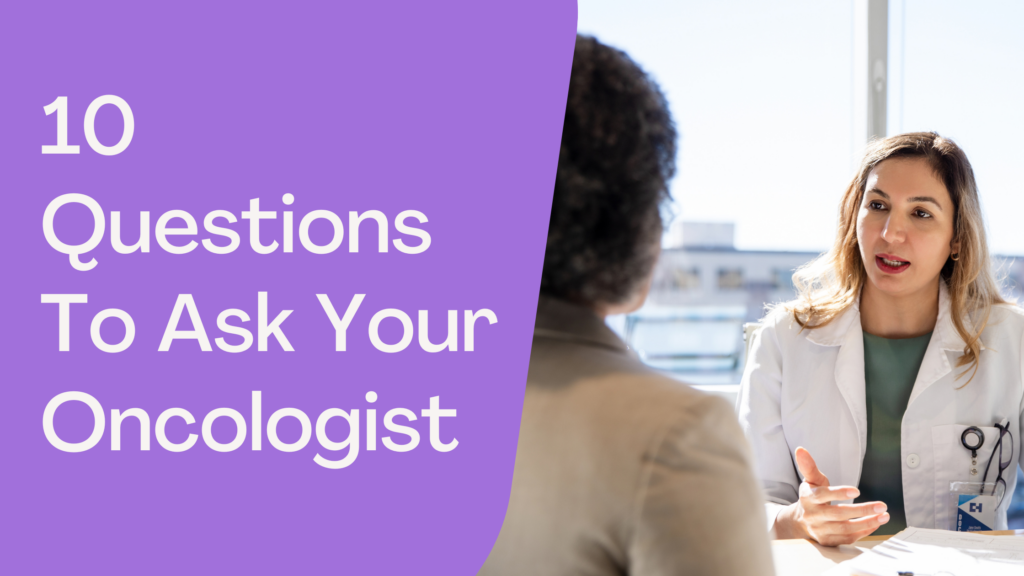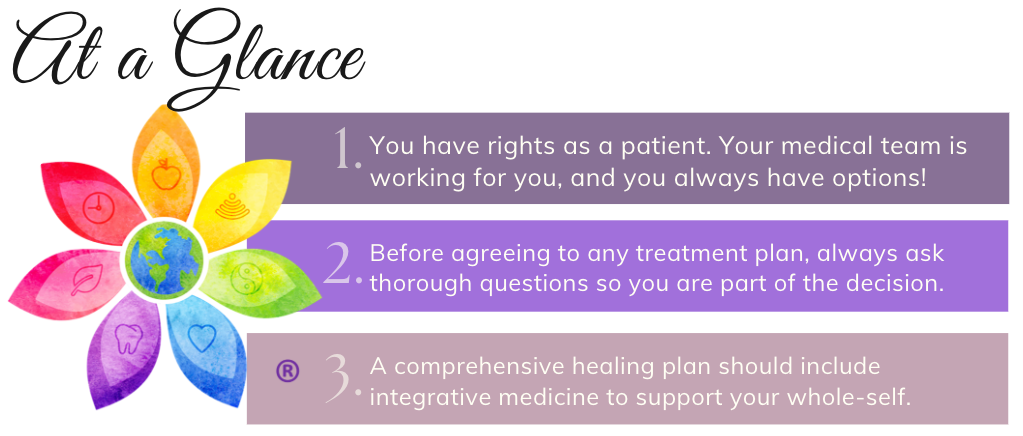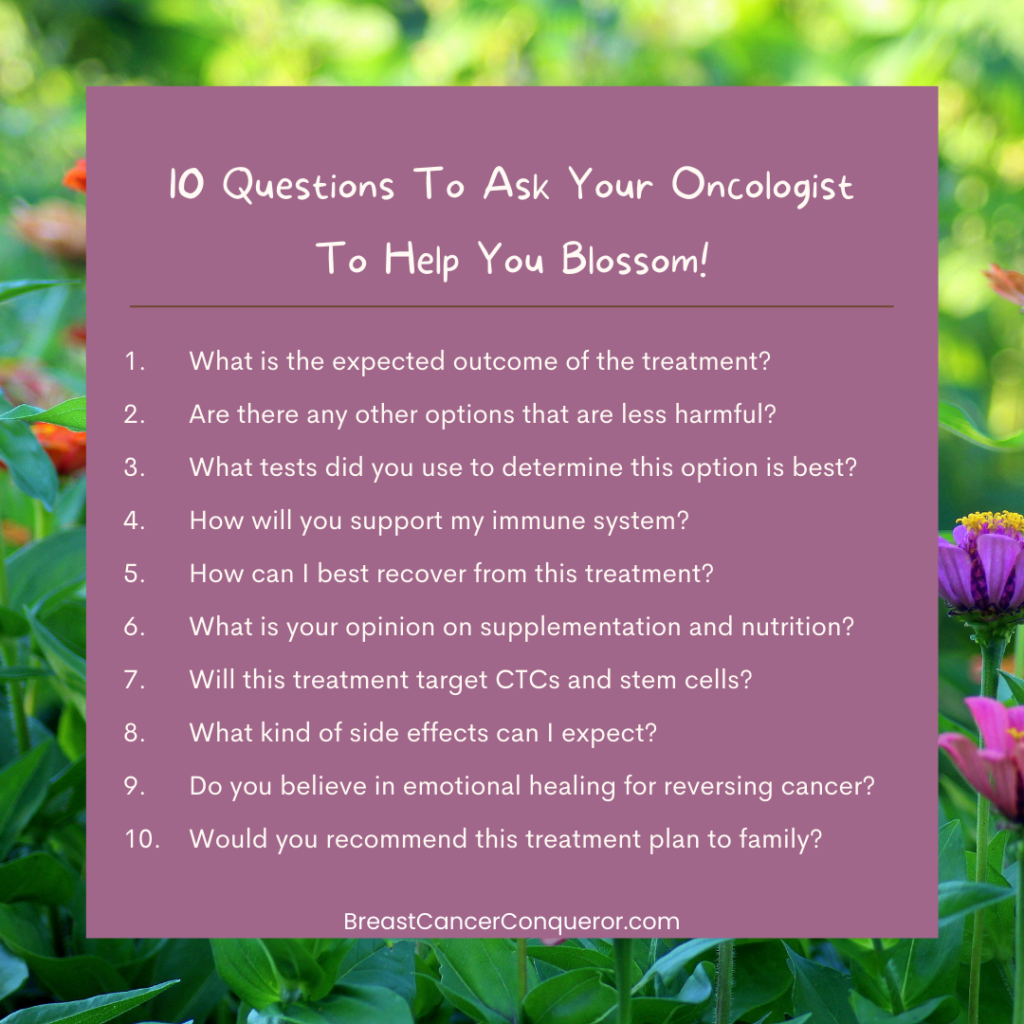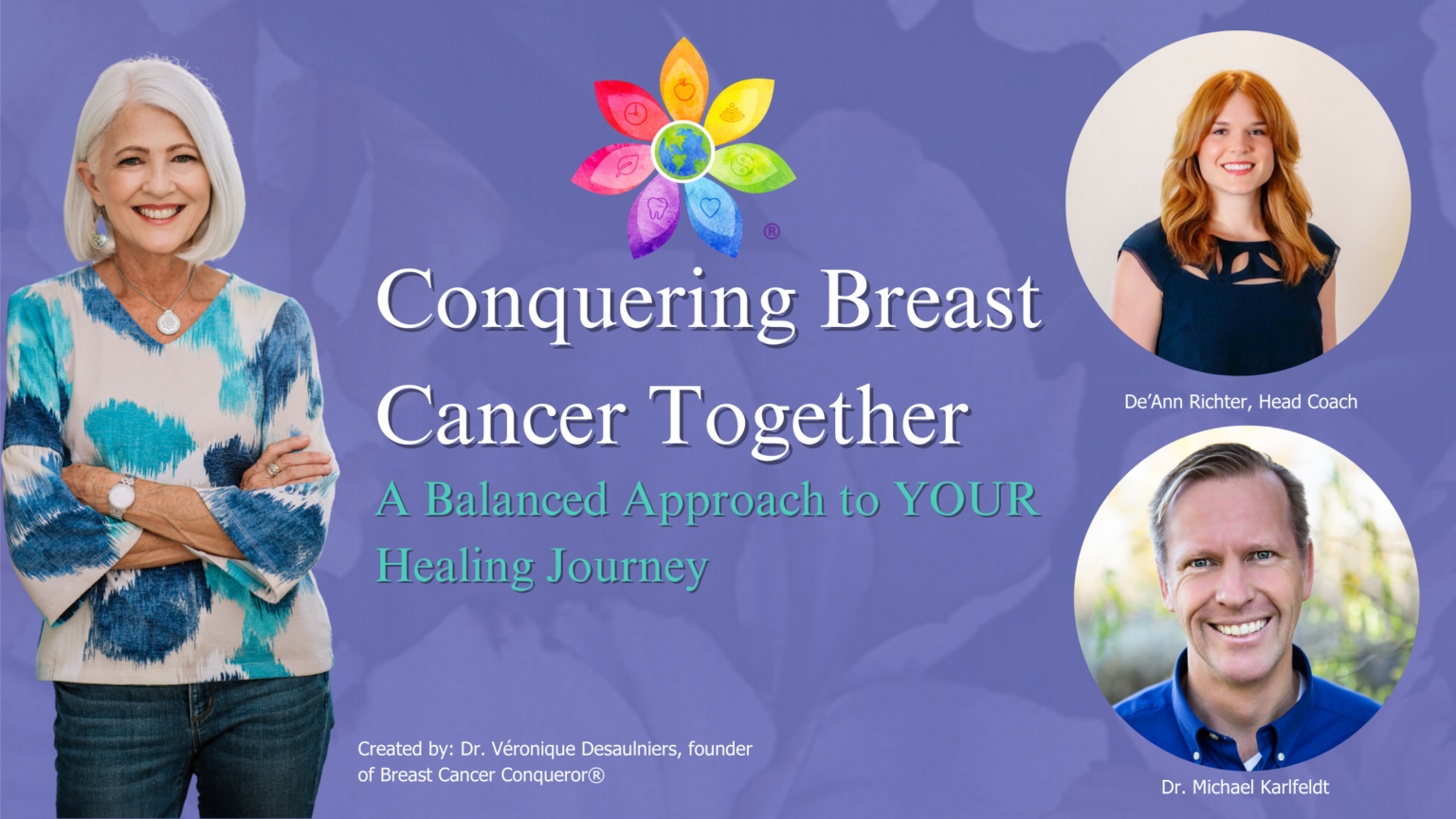

Getting diagnosed with breast cancer (or recurrence) does NOT mean you just have to go into survival mode and do the first thing the first doctor tells you to do. It actually means leaping into THRIVING MODE by advocating for your unique healing plan! Yes, of course, you want to get rid of the scary “lump” ASAP. And it’s vital to figure out what caused the lump in the first place by diving deep into your physical, emotional, mental, and spiritual life. It is critical to know that you have SO MANY OPTIONS, and it all starts with asking your oncologist questions. Please take the time to research several types of treatment options and medical and healing professionals to join your journey to vibrant health.
This blog will go over:
- Your rights as a patient—it’s time to advocate for you!
- 10 questions to ask your oncologist.
- How to create a comprehensive healing plan of action.
A breast cancer diagnosis can be one of the most frightening experiences of your life. However, a confusing, fear-based treatment plan that does NOT make room for options, or your say in anything, can sometimes feel even worse. I’m here to give you a big heart hug and tell you there is a better way! YOU NEVER HAVE TO FEAR BREAST CANCER AGAIN!
You Have Rights As a Patient
It’s time to be a well-researched, strong advocate for yourself! You know your body better than anyone else ever will. Remember: your doctor is working for you. Many people feel intimidated around doctors but remember that this is your body that you and your doctor are discussing. You have the right to ask questions (any and all questions!), and your physicians must inform you of all significant health risks associated with the treatments they are suggesting. You also have the right to second, third, fourth, etc. opinions. If you leave your doctor’s office feeling disempowered, pessimistic, and perhaps even bullied, you should look for another oncologist or doctor.
For example, if your doctor says blanket statements such as, “If you don’t do this treatment, you will die,” or “You don’t have a choice. You can only do X, Y, and Z”. Or if their demeanor just comes off as cold or you just feel like another number in their lineup, it may be time to find a new person to trust with your life.

10 Questions to Ask Your Oncologist Before Chemo, Radiation, or Surgery
Here are 10 VITAL questions to ask before you say yes to any conventional treatment plan:
#1 What is the expected outcome of the treatment? What are the benefits and side effects?
#2 Are there less harmful options? For example, Dendritic Cell Therapy may be a good option.
#3 What tests did you use to determine this is the best treatment for me? For example, if your doctor suggests chemo, then ask why they think that specific drug is best for you.
#4 How will you support my immune system during and after this treatment? Vitamin C IVs, immune system supplements, TQ (thymoquinone), selenium, and curcumin are proven beneficial in boosting immune systems during and after treatments.
#5 How can I best recover from this treatment? Do you recommend any natural health protocols, lifestyle changes, or ways to detoxify? DMSA and Modified Citrus Pectin are both effective and safe ways to remove heavy metals from your body. Buying beauty and home products that don’t contain damaging toxins and harmful estrogens is another important lifestyle change to make.
#6 What is your opinion on supplementation and nutrition while I am on this treatment and afterward? If your doctor isn’t skilled in this area, and you want a clear roadmap of what to do, Conquering Breast Cancer Together is for you!
#7 Will this treatment target cancer-circulating tumor cells and stem cells?
#8 What kind of side effects can I expect? Are they permanent?
#9 Do you feel that there is an emotional aspect to reversing cancer? There absolutely is! That is why Essential #4 is Heal Your Emotional Wounds.
#10 Would you recommend this treatment plan to your wife, child, or yourself?
How To Create a Comprehensive Healing Plan
One thing I know to be true is that taking an integrative (Western and Eastern Medicine) approach is the best way to heal. You don’t have to settle for just doing ONE type of treatment. In fact, you need to stay far away from someone who says you only need to do one thing to heal. For example, natural medicine (Thymoquinone supplements and eating cruciferous vegetables) can make traditional treatments (such as chemo) more effective and reduce the toxic side effects.
Your healing team could include an oncologist, massage therapist, best friend, acupuncturist, Chiropractor, functional medicine doctor, art therapist, Breast Cancer Conqueror Coach, nutritionist, EFT coach, Chinese Medicine practitioner, etc. Just like it takes a village to raise a child, it takes a village to support a happy and healing Breast Cancer Conqueror!
 To learn more about taking an integrative approach to your healing journey, please check out: Conquering Breast Cancer Together This program wraps up everything Dr. V has learned in my decades of helping women, and myself, thrive after a breast cancer diagnosis.
To learn more about taking an integrative approach to your healing journey, please check out: Conquering Breast Cancer Together This program wraps up everything Dr. V has learned in my decades of helping women, and myself, thrive after a breast cancer diagnosis.
If this all seems super overwhelming, because it definitely can be, working with a private coach will give you 1:1 support in helping you create a comprehensive healing plan. Your coach will always be a phone call away for questions, guidance, encouragement, and support.